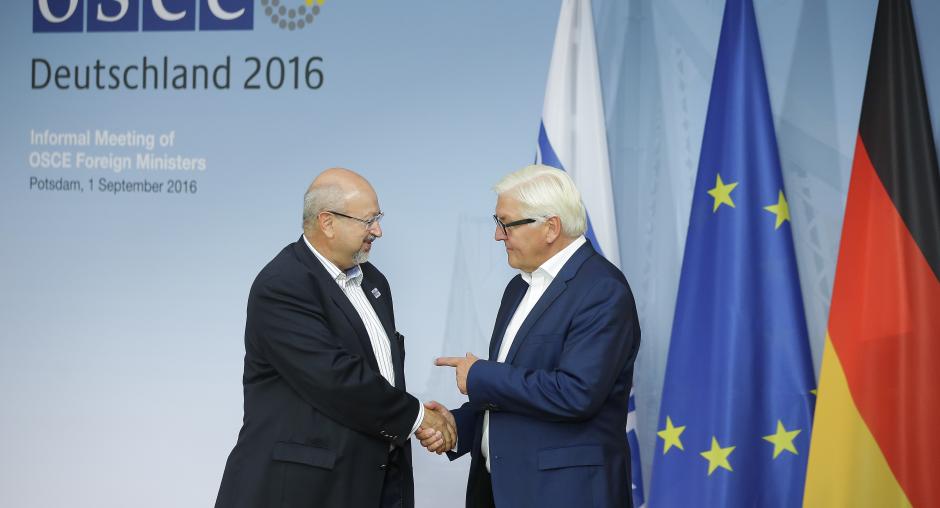Informal OSCE Ministerial discussions focused on organization's future agenda

POTSDAM, Germany, 1 September 2016 – “It is my firm belief that we must work together to face the common threats of our times and to make use of the OSCE more effectively as a central platform for dialogue,” said OSCE Chairperson-in-Office and German Foreign Minister Frank-Walter Steinmeier at the end of the Informal Meeting of OSCE Foreign Ministers in Potsdam today. “At a time when we are facing grave differences of opinion and a loss of trust in the Euro-Atlantic and Eurasian area, we as political leaders have a duty to listen to each other and to re-engage in genuine dialogue,” Steinmeier added.
Steinmeier welcomed the broad attendance by participating States and the lively, direct and results-oriented exchange between ministers. He called on the participating States to use the full potential of the OSCE as a platform for dialogue and exchange and to adapt to new challenges such as international terrorism and the consequences of the refugee and migration crisis for open and democratic societies. “At the same time, these challenges must not be used as a means to justify the restriction of human rights, fundamental freedoms and democratic standards. Only comprehensive security can constitute enduring security,” he emphasised.
With regard to the crisis in and around Ukraine, Steinmeier lauded the OSCE’s essential role in the Trilateral Contact Group and the committed work of the Special Monitoring Mission to Ukraine (SMM). He underlined that all sides must fully guarantee the security and safety of the SMM monitors and equipment and ensure their unfettered access throughout the country, including in the conflict area. Steinmeier welcomed the fact that the sides re-committed to full adherence to the ceasefire at the beginning of the new school year: “I expect that all sides finally live up to their commitment to respect the ceasefire permanently.”
Steinmeier also underlined that a re-launch of conventional arms control was urgently needed to adequately address today’s security challenges in a cooperative way. A new, dangerous arms race on the European continent must be prevented and a return to restraint, predictability, transparency and trust must be supported in order to reduce military risks, he added.
“The spirit of Potsdam will guide our course in preparing the forthcoming Ministerial Council in Hamburg. I count on each participating State’s sense of political ownership for our organisation,” Steinmeier said. He also stressed the importance of defining a concrete, project-oriented common agenda for the OSCE’s future. This approach should form the basis for strengthening the OSCE and its institutions as a whole.
On the margins of the meeting, OSCE Secretary General Lamberto Zannier said: “I thank the German Chairmanship for providing this welcome opportunity for a frank discussion at ministerial level on the work of the OSCE and the road ahead. The OSCE is doing its part to address the complex and interconnected challenges to security and stability confronting us today – and in many cases, we could do more. With adequate resources, we could further strengthen our capacities to respond quickly and effectively to the growing array of security challenges facing our region.”
